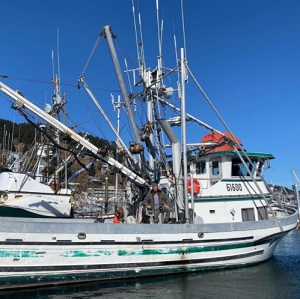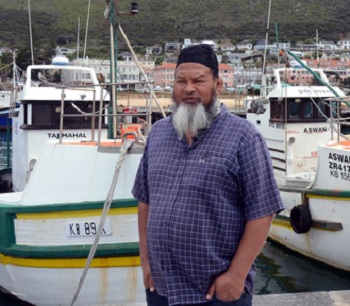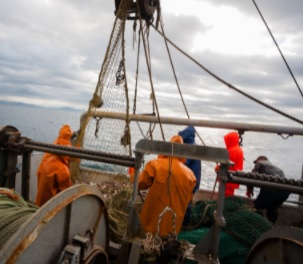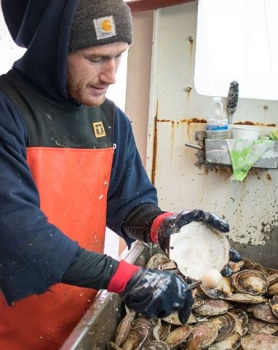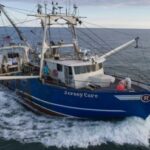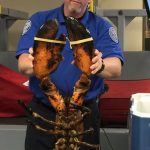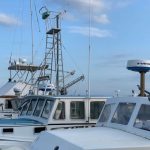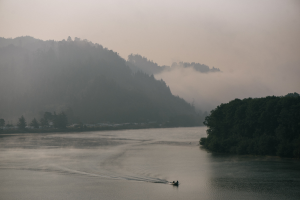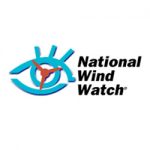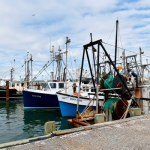Tag Archives: commercial fishing
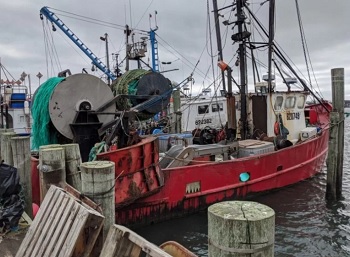
Amid Hamptons Mansions, East End Fishermen Beat On Against The Tide
On Gosman’s dock in Montauk, seagulls hovering above, I was greeted by the smells of gasoline and fish as I walked on the worn, white-speckled planks. The water looked invitingly blue, and a group of fishermen were readying their vessel for a day’s work. One of the fishermen and I exchanged nods. A cigarette hung from his lips and he wore heavy work gloves, thick orange waders with suspenders and a greasy baseball cap. The romanticized life of Montauk fisherman seeped into my head,,, >click to read< 10:48
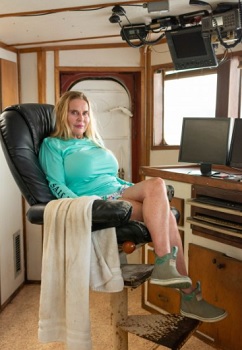
Shrimpin’ Ain’t Easy
Miss Marilyn Louise, a third-generation commercial fisherwoman, is one of the largest contributors to the seafood supply chain coming through Mayport Inlet. The lifelong resident of Mayport Fishing Village walked me through what it’s like to live a life sustained by the ocean. As a child, Miss Marilyn learned to run shrimp boats from her father and grandfather. She’s since passed her knowledge and experience on to her own children, having taken her son out shrimping with her when he was only 11 days old, noting he had sea legs before he could walk on land. >click to read< 07:56
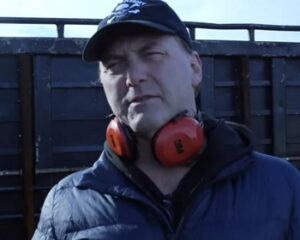
What Happened To Andy Hillstrand From Deadliest Catch?
Discovery Channel crab fishing reality TV series “Deadliest Catch” chronicles real-life expeditions by various boating crews in the Bering Sea, based out of a port located in Dutch Harbor, Alaska. Longtime series regular Andy Hillstrand, however, left “Deadliest Catch” completely, leaving some fans wondering what happened to the former series mainstay. Initially, Andy’s departure coincided with the retirement of his brother Johnathan Hillstrand, with whom he essentially shared captain’s duties on their boat, the FV Time Bandit. >click to read< 18:11
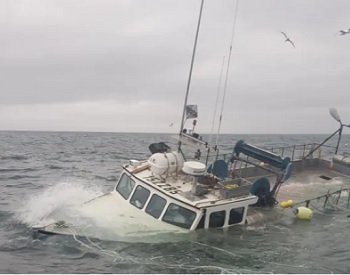
Fishing boat Captain is grateful for the quick response of his fellow fishermen
Élie Dugas, captain of the fishing boat that sank off Miscou on Monday morning, said he’s grateful for the help from fellow fishermen. Within minutes of his distress call at about 6:30 a.m., about eight boats were in sight, ready to help rescue the crew,,, He said he bought the Maximilien two years ago. “It’s a hard blow,” said Dugas, who is based in Miscou and has been fishing for 46 years. Rescuers first tried to pump out the water and then tow the herring boat, but it was soon determined to be too dangerous. “We couldn’t save the boat,” said Fisherman Steven Hughes,, The four crew members of the Maximilien were taken safely to shore. >click to read< 12:16
Safety Bulletin 17: Safety concern over lifting operations on fishing vessels
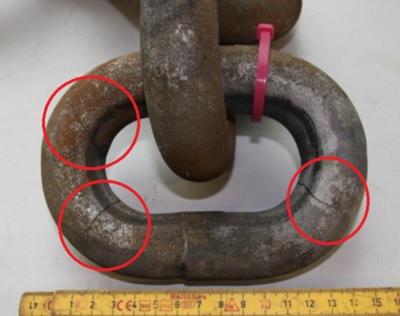 The Maritime and Coastguard Agency are issuing this safety bulletin to remind owners, employers, skippers and crew of UK fishing vessels of their responsibilities regarding health and safety following a number near misses, accidents, and a fatality – during lifting operations. Although applicable to all fishing vessels it is scallop dredgers that are of immediate concern. >click to read< -22:27
The Maritime and Coastguard Agency are issuing this safety bulletin to remind owners, employers, skippers and crew of UK fishing vessels of their responsibilities regarding health and safety following a number near misses, accidents, and a fatality – during lifting operations. Although applicable to all fishing vessels it is scallop dredgers that are of immediate concern. >click to read< -22:27
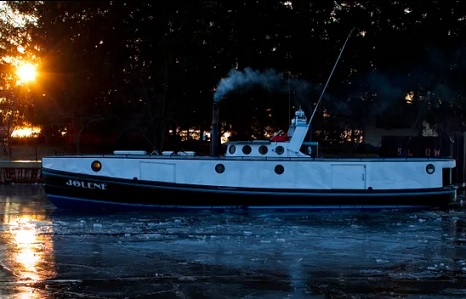
The last in a long line of Milwaukee commercial fishermen sets course for Alaska
The men have always started their day wondering whether a load of fish is straining the nets that they set the day before. Today their compass doesn’t point them toward any nets at all. The boat’s rumbling 855 Cummins diesel pushes them down the muddy Kinnickinnic River and under the Hoan Bridge. This is the moment when their eyes normally train on the open waters ahead. But today, the 52-year-old man notices his dad, Alvin, is glancing back. I think this is probably going to be the last time I see Milwaukee from the water, 77-year-old Alvin Anderson says. Yeah, his son, Dan, replies glumly. Then Milwaukee’s last working commercial fishing tug – the Alicia Rae – glides through the north gap of the Milwaukee Harbor breakwater. And it is gone. 20 photo’s, >click to read< 08:10
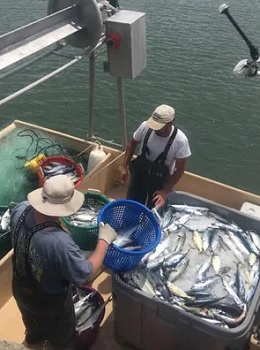
“We’re in pretty bad shape,” Commercial fishermen, fishing industry decline over the past 20 years
North Carolina commercial fishermen have complained for decades that government regulations and a variety of other factors threaten their livelihood and have them headed the way of endangered species. Glenn Skinner of Newport, executive director of the North Carolina Fisheries Association an advocacy group of commercial fishermen, said statistics back that up. “These declines are the result of many different factors. with regulations, the fear of future regulations or outright bans on commercial fishing gears being a significant factor,” Skinner said. He said public perception and political agendas drive the regulations. >click to read< 11:26
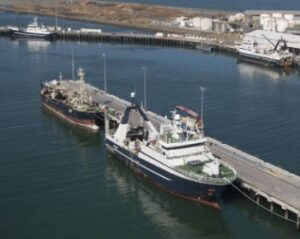
New Zealand: Reparation sought for family of man who died on Sanford factory trawler
New Plymouth man Steffan Antony Stewart, 26, was discovered fatally injured on the factory deck of the San Granit on November 14, 2018, after becoming trapped in a piece of machinery aboard the New Zealand-registered deep-sea factory trawler. The deckhand immediately raised the alarm, but after Stewart was removed from the accumulator the ship’s medic found no signs of life. The 67-metre vessel, which had been trawling 102 kilometres east of Banks Peninsula, immediately returned to Timaru’s port, arriving about 4pm that day. Representatives of Maritime New Zealand and Sanford appeared before Judge Tony Couch in the Timaru District Court on Thursday. >click to read< 09:25
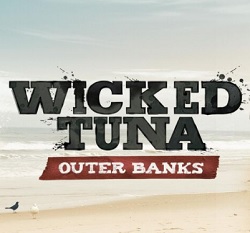
Occupational Change! From Wall St. to the T.V. Tuna Fleet!
Tuna fisherman Captain Bobby Earl was fishing off the coast of North Carolina last summer when his boat exploded, a saga that the Baysider chronicles in this season of Wicked Tuna: Outer Banks, a fishing reality show. While Earl counts escaping the blazing boat as among “the most surreal experience[s] of my life,” the Wall Street manager turned commercial fisherman has had a rather unusual life trajectory. Earl was born and raised in Bayside, Queens, before rising through the ranks on Wall Street. When the housing market crashed in 2008, Earl got fired from his job as a regional manager for Bank of America investments. 2008 changed my life too. >click to read< 11:44
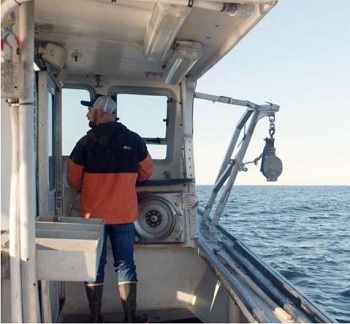
A Day in the Life of Maine Lobsterman, Mike Sargent, in his own words.
“A lot of people think it’s like Deadliest Catch,” Mike Sargent says with a laugh. But his days are very different from the high-stakes drama of a reality show. Learn about what it takes to bring lobster from the bottom of the Atlantic Ocean to your plate with a day in the life of Sargent, in his own words. 3 am: I’ll get up and check the weather forecast. I’ll check the marine buoy data, see if there’s any inclement weather coming or going. If we’re all good to go, I will message my crew, say, “Yep, we’re set to go today.” They’re usually up and at ’em anyway, so I have them on standby. And then, I pack my lunch and head to the wharf. 4 am: I meet my crew down at the wharf,,, >click to read< 16:41
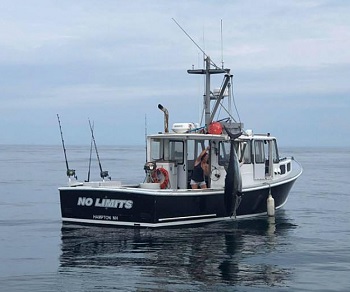
You don’t need five shirtless dudes to catch a big fish. One badass woman can get the job done.
If I want to be as badass as Michelle Bancewicz Cicale from Seabrook, I have some work to do. But hey, you gotta start somewhere! Michelle has been fishing most of her life. Like most things, if you implement the three P’s, practice, patience, and persistence you are bound to get better at it. In 2015 she started fishing mostly for tuna and in 2019 she bought her own boat. The FV No Limits. “No Limits” seems like an appropriate name for Michelle’s boat. ESPECIALLY after she reeled in this monster of a Blue Fin on her first solo venture! photo’s,>click to read< 07:43

Fisherman Lance Eric Norby bought a boat sight unseen and named it PNEUMA. “can’t” was not in his vocabulary
Lance Eric Norby entered God’s kingdom on July 1st, 2021, doing what he loved most, in hopes that soon he would be living his dream of giving up his mandatory 6-7 day workweek and begin enjoying the adventurous lifestyle Alaska had to offer. He had an eidetic memory and knew every job at the General Motors Assembly plant where he worked. About four years ago, Lance was introduced to the world of commercial fishing by his good friend, David Schwantes. After a couple Summers of working with and for David on his boats, last year he bought a 32′ aluminum commercial fishing boat, sight unseen, during Covid, naming it PNEUMA. >click to read< 07:55
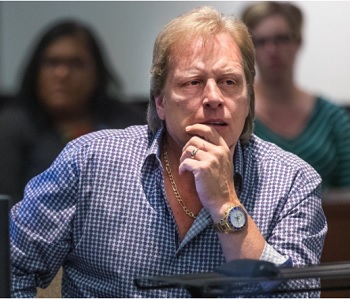
The Deadliest Catch has been a huge success story for Captain Sig Hansen
American captain Sig Hansen is the leading figure behind the fishing vessel named F/V Northwestern. Sig Hansen’s net worth is estimated to be $4 million. Sig came under huge prominence after starring in each season of the popular documentary television series Deadliest Catch. Later Hansen served as technical advisor for the production team. Sig Hansen has been a constant in the show while entertaining fans with their daily life adventures on the sea. While he later stunned fans by announcing that he is not going to be a part of the television show anymore, he later did return for season 8 of Deadliest Catch.,, >click to read< 09:33
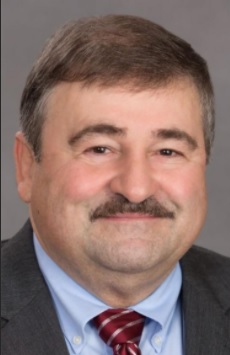
Mark Lawton Doumit, a commercial fisherman, politician, public servant, has passed away in Tenino, Wash.
Mark was born in Longview, Wash., on November 26, 1961, to Eli and Patricia Doumit and was the 10th of 11th children. He grew up in his family’s hometown of Cathlamet, Wash. While still in high school, Mark began a lifelong passion for commercial fishing. He began his career in the industry in high school, working on the Columbia River as a fish buyer. In college he began a nearly 40-year career in Alaska working in canneries and crewing on drift gillnet boats in Prince William Sound and Bristol Bay. Mark bought his own commercial salmon fishing operation in Cook Inlet, Alaska in 1986 and spent the remainder of his fishing career between Cook Inlet in the summer and lower Columbia River in the spring and fall. One of his great joys in life was the opportunity to fish alongside his sons and so many of his family and friends. >click to read< 09:24
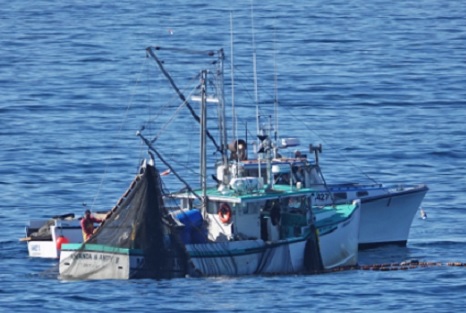
Commercial Fishing Up Close – Pat Morss
There has been a lot of sport fishing in close to the Eastern Point rocks recently, and this morning a spotter plane and two commercial fishing boats out of Gloucester got our attention. The photo captions below may just be my imagination, but this is what it looked like. >click to view ten photos< 07:43
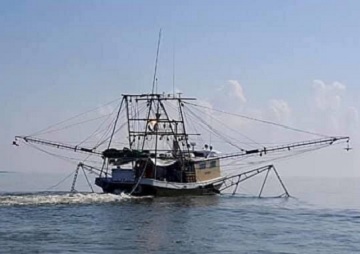
Persistence, ability to overcome adversity keeps this local trawler going after 30+ years
The job of a trawler is the same every day: catch shrimp. But the opponent one is up against (weather, seas, Mother Nature) is always slightly different each day. Being able to adjust to the unknown is Thomas Crosby’s specialty on the water. It’s a skill he believes allows him to be a good fisherman. The captain of the ‘Limited Edition’ since the late 1980s, Crosby has been on the water for as long as he can remember. The experienced captain said a good trawler is capable of adapting, adjusting and rolling with the punches, even if they come often and from a lot of unexpected directions. >click to read< 18:28
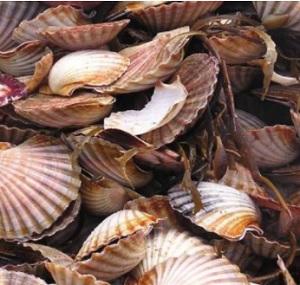
Individual transferable quota system hurting Tasmania’s fishing fleets
“ITQs have caused a decrease in owner operators and a decrease in active vessels in the fleet,, “Separation of ITQ ownership from the fishing sector has created a whole range of unintended consequences, which have ultimately seen the flow of majority of profits to investors, not the fishing fleet.” King Island Council deputy general manager Kate Mauric told the committee some fishermen felt disadvantaged due to contract management from investors, though this was not as pronounced on the island as elsewhere. >click to read< 10:54
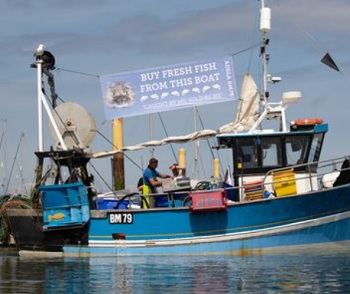
Life of a Brixham fisherman selling catch straight off his trusty trawler
He’s the skipper, captain, engineer, cook, and cleaner of the Adela BM79 – a bright blue mini trawler. At 9 meters long, she’s Brixham’s smallest and self-professed ‘prettiest’ fishing boat. Recently, Tristan Northway has earned himself a new title to add to his roster, one that seemingly comes as naturally as the wind to a sail. Tristan is Brixham’s only licensed floating fishmonger; selling freshly caught fish directly from the boat on any day that he can get out to sea. “It’s not easy,” says Tristan. “I’m going out at 2 in the morning. I came home at 4 this afternoon. And I probably won’t go to bed until 10 tonight.” >video, photos, click to read< 07:44
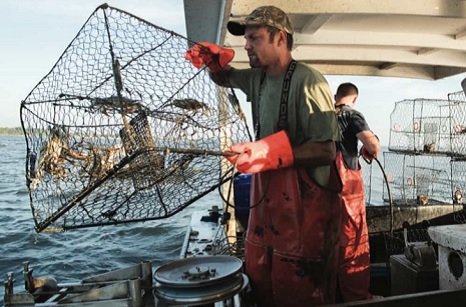
The Last Watermen
In April 2002, the city ordered Alexander “Skip” Parkinson, a crabber, to leave his permanent slip under its first-come, first-served docking policy, making him the last waterman, and his boat the last workboat, at City Dock.,, One Saturday last August, I paddleboarded from Spa Creek in Annapolis to Back Creek in Eastport, landed on Cap’n Herbie Sadler Watermen’s Park,, There, I met Pat Mahoney, Jr., the “last waterman of Annapolis.” Mahoney not only owns Wild Country, along with his father, Pat Mahoney Sr., but he catches the seafood they sell and takes great pride in keeping the “last waterman” title in the family. For him, the word means more than just making a living from the Bay. “It’s about keeping a tradition alive, adapting to challenges, and loving the water,” says Mahoney. >click to read< 10:15
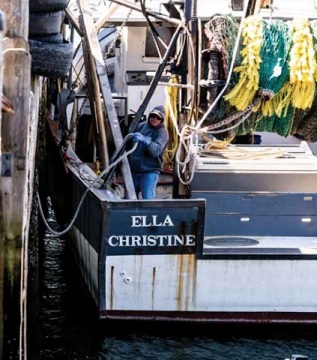
The Last of the Port Clyde Groundfishermen – Once robust, Maine’s groundfishery is on the ropes
When Randy Cushman was growing up in Port Clyde, some 300 trawlers were moored up and down Maine’s coast,,, Today, Cushman is 59 years old and might be Maine’s most knowledgeable commercial fishermen.,, But Cushman is barely scraping by. Prices for cod, flounder, and other groundfish have all but collapsed in Maine. The combination of rock-bottom prices, the need to protect the state’s fish stocks, and a dearth of fishing infrastructure make it harder than ever to be a fisherman here. Today, the robust Maine trawler fleet of Cushman’s youth has been reduced to around 30 boats. photos, >click to read< 14:21
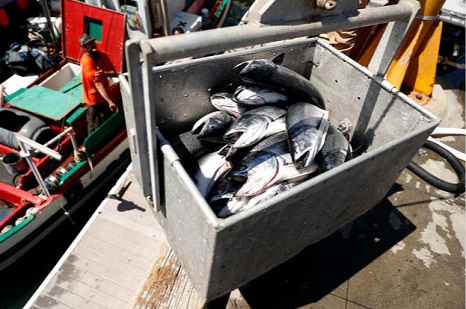
Choppy Weather and Fishing Limits gets California salmon season off to slow, expensive start
Commercial fishing boats may only fish south from Pigeon Point on the San Mateo coast, instead of in the typical area open all the way to Mendocino County this time of year. Strict limits on this year’s salmon season were set by the Pacific Fisheries Management Council in consideration of what’s expected to be a smaller population of adult king, or chinook, salmon in the ocean this year. The geographic limitations and conditions are keeping local fishing boats in Monterey Bay for now, but some of the fish are making their way to the Bay Area. Sarah Bates came down to Monterey Bay from San Francisco with a crew member on her boat, F/V Bounty. “Everybody is in the bay because it’s the only place to hide from the afternoon wind,” The limited season means they don’t have much of a choice, Bates said. “We feel pressure to fish in bad weather where there’s so few days,” she said. “We’re pretty much going to go fishing no matter what.” photos, >click to read< 21:09
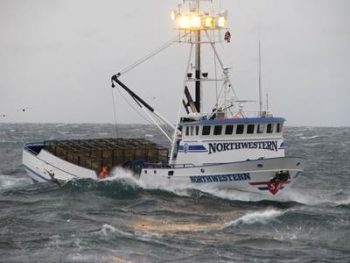
Sig Hansen Opens Up About Deadliest Catch
The longtime boss of the F/V Northwestern still characterizes the crab season depicted in the epic 17th season of the Discovery Channel hit “Deadliest Catch” as the most calamitous one he’s ever endured. Aside from the thorny Coronavirus protocols that challenged any television production in 2020 and 2021, the crabbing crews faced another seemingly insurmountable obstacle that had nothing to do with making a TV show. For the first time ever, the captains and their crews were fishing blind,,, Hansen chats about it all, from the most grueling “Deadliest Catch” season ever, >click to read< 17:16
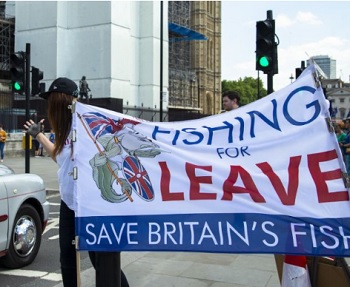
Brexit: how it started, how it’s going
The European Parliament votes Tuesday on the EU’s divorce settlement with Britain, the 1,246-page Trade and Cooperation Agreement. The deal averted tariffs or quotas on almost all goods produced in the UK and EU. The new standards and attendant bureaucracy are having an impact on trade. UK exports of live mussels, cockles, oysters and other shellfish are no longer allowed to enter the EU. Most come from Scotland, and the industry says it is staring at collapse. Britain’s government, however, says the coronavirus pandemic has been the bigger factor affecting trade since the Brexit deal took effect. >click to read< 07:32
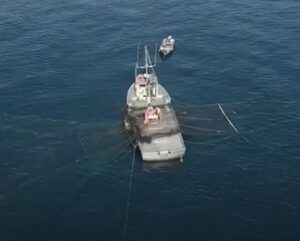
Inland Fisheries: A big fight in Lansing over fishing rules on the Great Lakes
Dana Serafin still hauls in 20,000-pound boatloads of whitefish to supply regional restaurants and markets, Native whitefish, the main livelihood for Serafin and other Great Lakes commercial fishermen, have been in decline for years amid changes to the food web, replaced in Serafin’s nets by healthier populations of walleye and lake trout that he’s not allowed to keep. Chinook salmon, once a favorite of recreational anglers on lakes Michigan and Huron, have also plummeted in Lake Michigan, and all but disappeared from Lake Huron. Battles are brewing over fishing rights from recreational, commercial, Native American, and environmental group meddling. Video, >click to read< 13:41
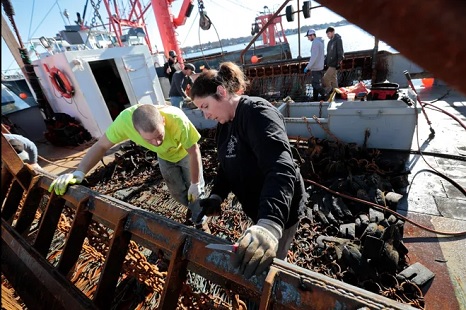
Women of New Bedford’s Waterfront
Captain Jessica Walker, 34, first stepped foot on a commercial fishing vessel, which happened to be the Legacy, when she was 19. The college history major was looking for a summer job and this one was far from “potato country”, the place in Northern Maine she called home. She started with summer trips that eventually became full-time work. She worked her way up to mate and learned everything from the boat owner and previous captain, David Wilhelmsen. When he stepped down, Walker assumed the role of captain in the summer of 2013. Further up in the harbor, fishing vessel Reliance was docked earlier in the week for maintenance before departing for the next scalloping trip. Two men with welding helmets sat on the deck repairing the metal gear while Crystal Vaughan stood up in the wheelhouse attending to inventory. 21 photos, >click to read< 10:20
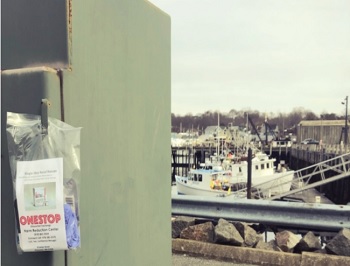
Tight-Knit Fishing Communities Navigate Drugs
Johnnie*, a salt-and-pepper fisherman in his late 50s, is smiling as he tells me what happened one dark night last year. “It was like a movie star, dropping down from the sky off the helicopter to get to my crewmate, pitch of night,” he says. “The Coast Guard—this handsome guy, my wife would’ve loved him, like Rock Hudson—dropped down from the moon. Felt like hours after we had given him all the Narcan we had. The Coast Guard still didn’t carry it back then, did you know that? So they pulled him up into the clouds and we all were left below at sea.”, “It’s not the first time that’s happened on our boat,” Johnnie says. “If we didn’t have that Narcan on board though, kid probably wouldn’t have made it.” >click to read< 19:13






